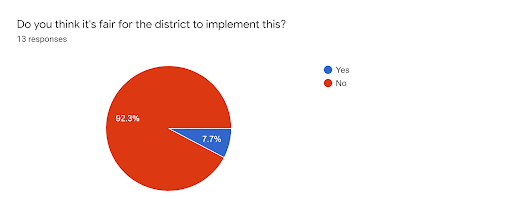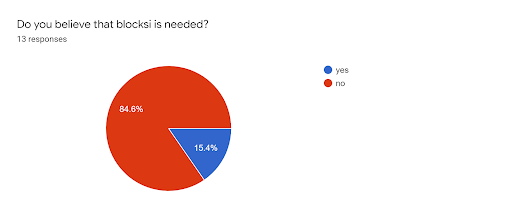“Is Blocksi an Invasion of Privacy?”
- yikes aashi
- Oct 27, 2020
- 4 min read
Updated: Nov 23, 2020
[This article does not represent the views of the Deadline team, but will be highlighting the voices of students. For the sake of privacy, all of the surveyors are to remain anonymous.]

Blocksi is a management program, founded in 2011, that allows teachers to have access and view to students’ window screens in their classrooms. Its purpose is to filter and monitor classroom screens. As of right now, it mainly functions on Chromebooks and Windows OS devices. Some of its features include real-time screen monitoring, live student analytics, and secure test mode.
At Middle College High School, they have implemented Blocksi on school-issued devices, specifically Chromebooks, in order to monitor their students’ screens. The justification behind the implementation is for teachers to make sure that students stay on task during school hours and don’t violate any rules while taking tests. Some students were unaware of the program being installed until their teachers brought attention to it. 13 students responded to the survey I put out and among the 13, 11 felt as though Blocksi was an invasion of their privacy.
When students became first aware of the program, it brought many mixed reactions. Some felt as though it wasn’t anything new and was a necessary program. “I wasn't shocked because we had this in middle school, just a different program. But those were school Chromebooks not personal,” explained a student. Another student shared a similar sentiment, as they believed that “it helps hold [them] accountable.” One student felt as if the usage of the program is justified stating, “... it allows teachers to be able to see if their students are doing what they are supposed to be doing in class….What is done in class should be school-related.” However, other students felt betrayed and “surprised that teachers would go to this length.” Students feel as though the program is “invasive,” unnecessary, and “unfair,” because “Lodi [gmail] accounts...can manage…[the] history already” and should not “...force all students to use Blocksi, especially when many...don’t want to.” The students voiced out that they were unaware that teachers were even watching their screen and are still unclear about how much teachers can see after the class is over. A student disclosed, “I was also concerned because I thought it was connected to my personal laptop and had no idea of when the Blocksi would stop or if it just kept going after school.”

Their biggest concern was the possibility of the program being linked to their personal accounts on their personal devices, which would lead to teachers being able to access private information stored on these accounts. A student voiced out, “I understand using it to supervise Lodi accounts pertaining to the school environment, but this extension violates that line that should be set apart between school life and our personal life.” Many other students share this sentiment as well, feeling uncomfortable with the idea of the program being possibly installed onto their personal device simply because they are unaware of just how much information is available to the teachers. Another student brings up this concern, “They can see our screen during class, so can they see our screen whenever? That’s what makes me uneasy.”
Many of the surveyors also expressed how they believe that Blocksi wasn’t needed whatsoever. “Even though it may be necessary when administering exams, it’s still questionable as to why they should be seeing our screens during the entire class period. Most of the time, students aren’t aware that...teachers can see our screens. It’s invasive because we don’t know and there’s no way to stop sharing our screen to the teachers.” As aforementioned, students believe that it is an unnecessary and drastic precaution to take because school-issued Chromebooks restrict inappropriate websites to use and document the browsing history. A student even expressed how they felt betrayed, as “it genuinely makes me lose trust for the teachers who use them[Blocksi]. Online school is already as difficult as it is. I don’t want to worry about my teachers snooping through my [personal] laptop as well [versus a school-issued Chromebook].”
However, few students assert that “... it is fair because [as] it gives everyone an equal chance. Most teachers are able to trust their students, but with distance-learning, in place, anything is bound to happen. I believe Blocksi is a good tool, and if people don't have anything to hide, they shouldn't be worried about it being used in school settings.”

Students believe that “these concerns should be addressed because this extension is taking our private data. Our personal files and bookmarks saved through our personal laptops should be for us and only us to see and not teachers or the district,” especially because, “Blocksi collects a lot of personal information, like your specific location, IP addresses, and more. The most concerning part is that it has the ability through administrators to edit, and then restrict your privacy settings.” As known...“On Blocksi’s own website, it is stated that all information sent and received from student Chromebooks passes through Blocksi’ servers. The information is analyzed and stored. This is already a massive invasion of privacy by itself. In addition, Blocksi reserves the right to give information collected on your devices to third parties for unspecified, vague reasons...” However, there is not any information available as to how much information is stored from personal devices.
Many students are uncertain as to how much the teachers can truly see. “I don’t know how much my teacher can see of my screen. I’m concerned that as long as I’m logged into my LUSD account, even though I don’t have any tabs open using that account, BlockSi can see my activity on [my personal] Chrome [browser].” Students continue to be confused as to just how much of their information is being monitored, and are uncomfortable with the idea of it being on their personal device without any assurance of privacy.
Contact Aashna Singh at s.aashna20 ‘at’ gmail (dot) com









Comments